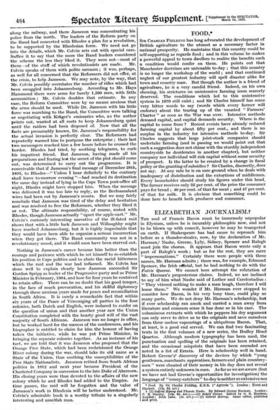FOOD.*
SIR CHARLES FIELDING has long advocated the development of British agriculture to the utmost as a necessary factor in national prosperity. He maintains that this country could be self-supporting as regards food ; and in this volume he makes a powerful appeal to town dwellers to realize the benefits such a condition would confer on them. He points out that Manchester doctrines are untenable to-day ; that this country is no longer the workshop of the world ; and that continued neglect of our greatest industry will spell disaster alike for town and country man. But though the author is a friend of agriculture, he is a very candid friend. Indeed, on his own showing, his strictures on unintensive farming seem scarcely deserved. The conditions which led to this unintensive system in 1870 still exist ; and Sir Charles himself has some very bitter words to say (words which every farmer will endorse) about the tearing up of the vaunted " Farmers' Charter " as soon as the War was over. Intensive methods demand capital, and capital demands security. Where is the capital to come from ? Recent events have already reduced farming capital by about fifty per cent., and there is no surplus in the industry for intensive methods to-day. Sir Charles suggests that large joint-stock companies should undertake farming (and in passing we would point out that such a suggestion does not chime with the sturdily.independe,nt countryside he desiderates in another chapter), but neither company nor individual will risk capital without some security of prospect. Is the latter to be created by a change in fiscal policy or the granting of subsidies ? Sir Charles, discreetly, does not say. At any rate he is on sure ground when he deals with inadequacy of distribution and the extortions of middlemen. Every householder should study his figures under this head. The farmer receives only 35 per cent. of the price the consumer pays for bread ; 40 per cent. of that for meat ; and 47 per cent. of that for milk. It is obvious .that something could be done here to benefit both producer and consumer.


































































 Previous page
Previous page